(完整版)【语法精讲】:will表示的一般将来时的用法
- 格式:doc
- 大小:21.51 KB
- 文档页数:2

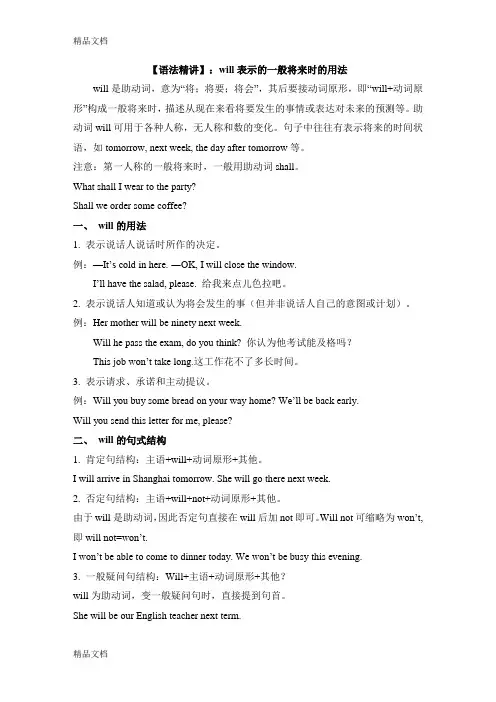
【语法精讲】:will表示的一般将来时的用法will是助动词,意为“将;将要;将会”,其后要接动词原形,即“will+动词原形”构成一般将来时,描述从现在来看将要发生的事情或表达对未来的预测等。
助动词will可用于各种人称,无人称和数的变化。
句子中往往有表示将来的时间状语,如tomorrow, next week, the day after tomorrow等。
注意:第一人称的一般将来时,一般用助动词shall。
What shall I wear to the party?Shall we order some coffee?一、will的用法1. 表示说话人说话时所作的决定。
例:—It’s cold in here. ―OK, I will close the window.I’ll have the salad, please. 给我来点儿色拉吧。
2. 表示说话人知道或认为将会发生的事(但并非说话人自己的意图或计划)。
例:Her mother will be ninety next week.Will he pass the exam, do you think? 你认为他考试能及格吗?This job won’t take long.这工作花不了多长时间。
3. 表示请求、承诺和主动提议。
例:Will you buy some bread on your way home? We’ll be back early.Will you send this letter for me, please?二、will的句式结构1. 肯定句结构:主语+will+动词原形+其他。
I will arrive in Shanghai tomorrow. She will go there next week.2. 否定句结构:主语+will+not+动词原形+其他。
由于will是助动词,因此否定句直接在will后加not即可。
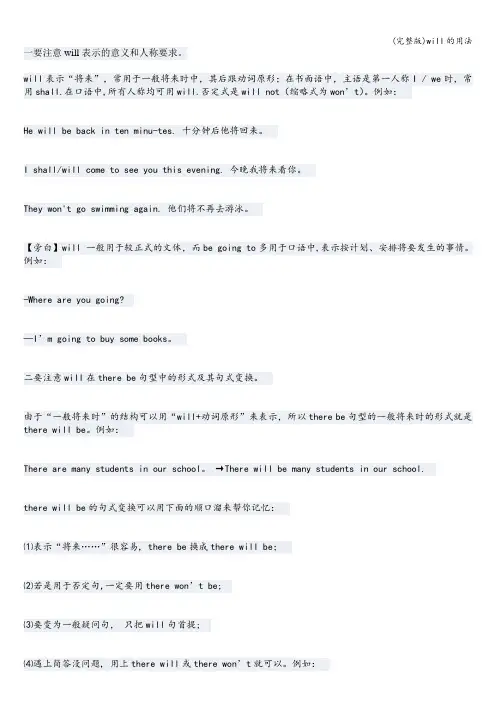
一要注意will表示的意义和人称要求。
will表示“将来”,常用于一般将来时中,其后跟动词原形;在书面语中,主语是第一人称I / we时,常用shall.在口语中,所有人称均可用will.否定式是will not(缩略式为won’t)。
例如:He will be back in ten minu-tes. 十分钟后他将回来。
I shall/will come to see you this evening. 今晚我将来看你。
They won't go swimming again. 他们将不再去游泳。
【旁白】will 一般用于较正式的文体,而be going to多用于口语中,表示按计划、安排将要发生的事情。
例如:-Where are you going?—I’m going to buy some books。
二要注意will在there be句型中的形式及其句式变换。
由于“一般将来时”的结构可以用“will+动词原形”来表示,所以there be句型的一般将来时的形式就是there will be。
例如:There are many students in our school。
→There will be many students in our school.there will be的句式变换可以用下面的顺口溜来帮你记忆:⑴表示“将来……”很容易, there be换成there will be;⑵若是用于否定句,一定要用there won’t be;⑶要变为一般疑问句,只把will句首提;⑷遇上简答没问题, 用上there will或there won’t就可以。
例如:⑴There is some pollution in our hometown. →There will be some pollution in our hometown.⑵ There will be more cars in ten years。

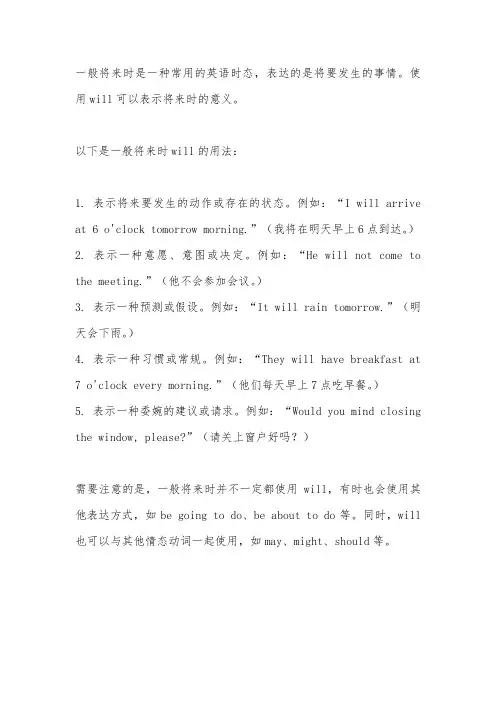
一般将来时是一种常用的英语时态,表达的是将要发生的事情。
使用will可以表示将来时的意义。
以下是一般将来时will的用法:
1. 表示将来要发生的动作或存在的状态。
例如:“I will arrive at 6 o'clock tomorrow morning.”(我将在明天早上6点到达。
)
2. 表示一种意愿、意图或决定。
例如:“He will not come to the meeting.”(他不会参加会议。
)
3. 表示一种预测或假设。
例如:“It will rain tomorrow.”(明天会下雨。
)
4. 表示一种习惯或常规。
例如:“They will have breakfast at 7 o'clock every morning.”(他们每天早上7点吃早餐。
)
5. 表示一种委婉的建议或请求。
例如:“Would you mind closing the window, please?”(请关上窗户好吗?)
需要注意的是,一般将来时并不一定都使用will,有时也会使用其他表达方式,如be going to do、be about to do等。
同时,will 也可以与其他情态动词一起使用,如may、might、should等。
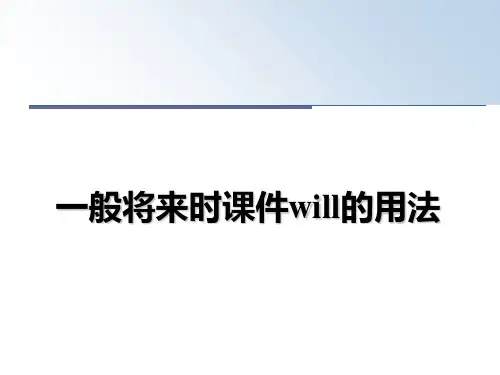
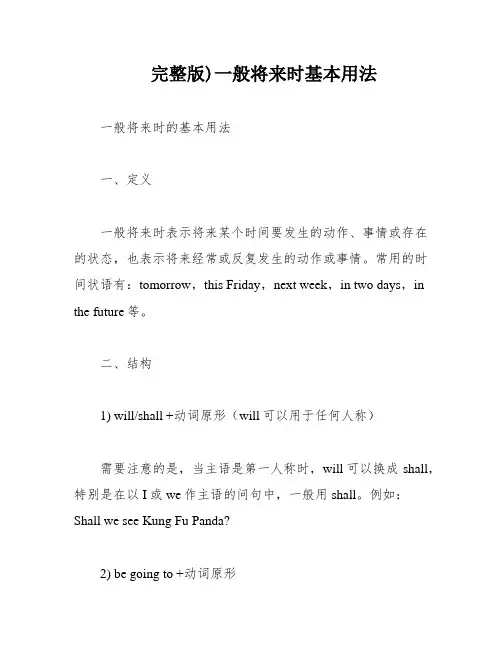
完整版)一般将来时基本用法一般将来时的基本用法一、定义一般将来时表示将来某个时间要发生的动作、事情或存在的状态,也表示将来经常或反复发生的动作或事情。
常用的时间状语有:tomorrow,this Friday,next week,in two days,in the future等。
二、结构1) will/shall +动词原形(will可以用于任何人称)需要注意的是,当主语是第一人称时,will可以换成shall,特别是在以I或we作主语的问句中,一般用shall。
例如:Shall we see Kung Fu Panda?2) be going to +动词原形例如:I’m going to play the piano。
be going to和will的区别be going to和will的用法虽然都表示将来发生动作或情况,一般情况下能互换。
但它们的用法是有区别的。
be going to主要用于:1、表示事先经过考虑、安排好打算、计划要做的事情。
例如:Dad and I are going to watch an opera this afternoon.2、表示根据目前某种迹象判断,某事非常有可能发生。
例如:Look。
There come the dark clouds。
It is going to rain.三、一般疑问句和否定句一般疑问句:1) will/shall +动词原形(will可以用于任何人称)——在will后加not2) be going to +动词原形——在be后加not例如:She will come back in three days.Will she not come back in three days?They are going to clean their classroom.Are they not going to clean their classroom?否定句:1) will/shall +动词原形(will可以用于任何人称)——将will提前2) be going to +动词原形——将be提前例如:She will come back in three days.She will not come back in three days.Will she come back in three days?XXX is whether they will actually do it。
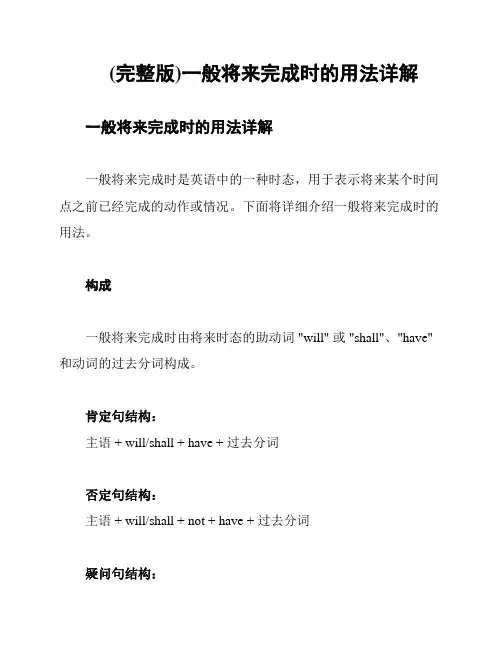
(完整版)一般将来完成时的用法详解一般将来完成时的用法详解
一般将来完成时是英语中的一种时态,用于表示将来某个时间点之前已经完成的动作或情况。
下面将详细介绍一般将来完成时的用法。
构成
一般将来完成时由将来时态的助动词 "will" 或 "shall"、"have" 和动词的过去分词构成。
肯定句结构:
主语 + will/shall + have + 过去分词
否定句结构:
主语 + will/shall + not + have + 过去分词
疑问句结构:
Will/Shall + 主语 + have + 过去分词 + 其他?
用法
一般将来完成时主要用于以下几种情况:
1. 表示将来某个时间点之前已经完成的动作或情况。
- I will have finished my homework by the time you arrive.
- By tomorrow, they will have already left for their trip.
2. 表示对未来某个时间点的预测。
3. 表示对过去某个时间点的未来完成的猜测。
- He will have passed the exam yesterday.
注意事项
1. 一般将来完成时通常用于将来时间点之前的动作或情况,因此在句子中应明确指出相关的时间点。
2. 一般将来完成时也可以与其他将来时态连用,如将来进行时、将来完成进行时等,以表达更复杂的时间关系和语义。
希望以上解释对您有所帮助。
如果您有任何疑问,请随时向我
提问。
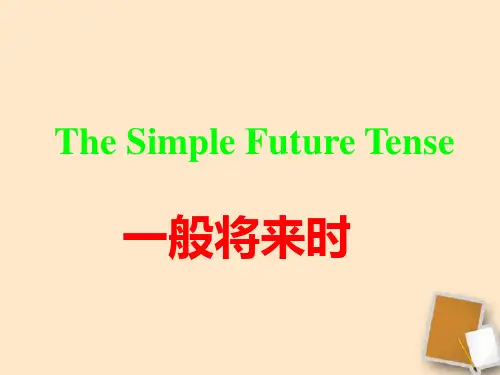

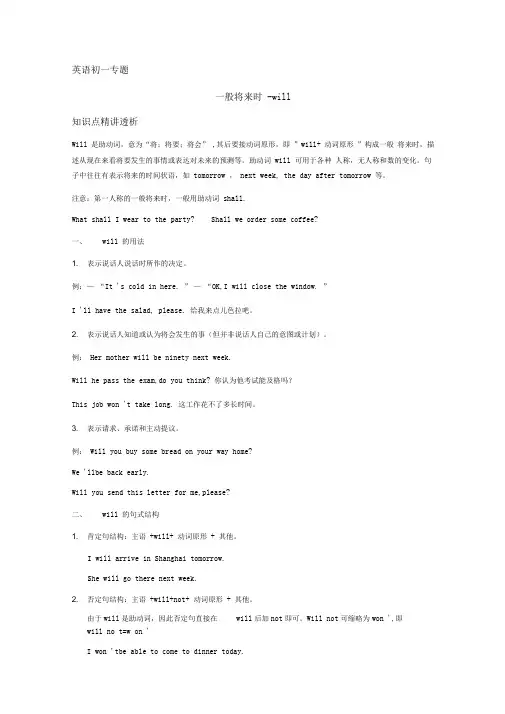
英语初一专题一般将来时 -will知识点精讲透析Will 是助动词,意为“将;将要;将会” ,其后要接动词原形,即”will+ 动词原形”构成一般将来时,描述从现在来看将要发生的事情或表达对未来的预测等。
助动词will 可用于各种人称,无人称和数的变化。
句子中往往有表示将来的时间状语,如tomorrow ,next week, the day after tomorrow 等。
注意:第一人称的一般将来时,一般用助动词shall.What shall I wear to the party? Shall we order some coffee?一、will 的用法1. 表示说话人说话时所作的决定。
例:—“It 's cold in here. ”—“OK,I will close the window. ”I 'll have the salad, please. 给我来点儿色拉吧。
2. 表示说话人知道或认为将会发生的事(但并非说话人自己的意图或计划)。
例:Her mother will be ninety next week.Will he pass the exam,do you think? 你认为他考试能及格吗?This job won 't take long. 这工作花不了多长时间。
3. 表示请求、承诺和主动提议。
例:Will you buy some bread on your way home?We 'llbe back early.Will you send this letter for me,please?二、will 的句式结构1. 肯定句结构:主语+will+ 动词原形+ 其他。
I will arrive in Shanghai tomorrow.She will go there next week.2. 否定句结构:主语+will+not+ 动词原形+ 其他。
一般将来时的基本结构和用法
一般将来时用于表示将来发生的动作或事件。
以下是一般将来时的基本结构和用法:
一、基本结构:
1. 肯定句:
- 主语 + will + 动词原形
- I will travel to Japan next week.
我下周将去日本旅行。
- She will study for the exam tomorrow.
她明天将准备考试。
2. 否定句:
- 主语 + will not (won't) + 动词原形
- They won't attend the meeting.
他们不会参加会议。
- He won't forget your birthday.
他不会忘记你的生日。
3. 疑问句:
- Will + 主语 + 动词原形 + 其他?
- Will you come to the party?
你会来参加派对吗?
- Will they finish the project on time?
他们会按时完成项目吗?
二、用法:
- 表示将来发生的动作或事件。
- 表示预测、承诺、意图、计划等将来的行为或状态。
- 通常与表示将来时间的时间状语连用,如 tomorrow, next week, in the future 等。
值得注意的是,一般将来时通常用于与将来相关的动作和事件,而对于已经计划或安排好的未来事件,可以使用 "be going to" 结构。
Grammar语法:simple future tense‘will'一般将来时1)表示将来某个时间要发生的动作或者存在的状态。
We shall go to see him tomorrow。
我们明天去看他。
2)表示将来经常或者反复发生的动作。
From now on I will come everyday。
从现在起,我将每天来。
will表将来时态,其后常跟的时间状语: tomorrow 明天, the day after tomorrow后天,next week下周, this Sunday这个星期天, in+以后的时间,in the future在将来。
肯定句结构主语+ shall / will +V原形She will arrive tomorrow. 她明天到。
shall与will的区别shall:常用于第一人称否定式:shall not=shan’twill: 常用于第二、第三人称,但在口语中各种人常都可以用will否定式:will not=won’t否定句结构主语+ shall / will+ not +V原形She will not arrive tomorrow。
他明天不会到。
一般疑问句结构Shall/Will+主语+V原形肯定回答:Yes, I/we + shall。
/ Yes. 主语+will。
否定回答:No, I/we shan’t./No, 主语+ won’t。
— Will she arrive tomorrow?她明天会到吗?— Yes,she will。
/ No, she won't。
will/shall的特殊用法(1)主语是第一人称I,we时,常用助动词shall+V原形I shall write you a letter next month. 我下礼拜将会给你写信。
(2) 在问对方是否愿意,或者表示客气的邀请时,常用will。
Will you go to the zoo with me?你能和我一起去动物园吗?(3 ) 在表示建议或者征求对方意见时,用shall。
will的用法归纳关键信息项:1、 will 作为助动词表示将来时态一般将来时的构成时间状语的搭配2、 will 表示意愿、决心表达个人意愿强调决心3、 will 用于预测、推测基于现有情况的预测没有确切依据的推测4、 will 用于请求、邀请礼貌的请求正式的邀请5、 will 表示习惯、倾向描述经常发生的动作或状态与频率副词的搭配6、 will 用于“主将从现”原则条件状语从句中的应用时间状语从句中的应用11 will 作为助动词表示将来时态111 一般将来时的构成“will +动词原形”构成一般将来时,表示将来某个时间要发生的动作或存在的状态。
例如:“I will go to Beijing next week”(我下周将去北京。
)“They will have a party tomorrow”(他们明天将举办一个派对。
)112 时间状语的搭配与一般将来时常用的时间状语有:tomorrow(明天)、next week /month / year(下周/下个月/明年)、in the future(在未来)、soon(不久)等。
例如:“She will come back soon”(她不久就会回来。
)“We will meet again next year”(我们明年会再见面。
)12 will 表示意愿、决心121 表达个人意愿当 will 用于表达个人意愿时,强调主语想要做某事的主观想法。
例如:“I will help you if you need”(如果你需要,我愿意帮助你。
)“He will not give up easily”(他不会轻易放弃。
)122 强调决心Will 还可以用来强调决心,表示坚决要做某事。
例如:“I will succeed no matter what”(无论怎样我都会成功。
)“They will finish the project on time”(他们决心按时完成项目。
【语法精讲】:will表示的一般将来时的用法
will是助动词,意为“将;将要;将会”,其后要接动词原形,即“will+动词原形”构成一般将来时,描述从现在来看将要发生的事情或表达对未来的预测等。
助动词will可用于各种人称,无人称和数的变化。
句子中往往有表示将来的时间状语,如tomorrow, next week, the day after tomorrow 等。
注意:第一人称的一般将来时,一般用助动词shall。
What shall I wear to the party?
Shall we order some coffee?
一、will的用法
1. 表示说话人说话时所作的决定。
例:—It’s cold in here. ―OK, I will close the window.
I’ll have the salad, please. 给我来点儿色拉吧。
2. 表示说话人知道或认为将会发生的事(但并非说话人自己的意图或计划)。
例:Her mother will be ninety next week.
Will he pass the exam, do you think? 你认为他考试能及格吗?
This job won’t take long.这工作花不了多长时间。
3. 表示请求、承诺和主动提议。
例:Will you buy some bread on your way home? We’ll be back early.
Will you send this letter for me, please?
二、will的句式结构
1. 肯定句结构:主语+will+动词原形+其他。
I will arrive in Shanghai tomorrow. She will go there next week.
2. 否定句结构:主语+will+not+动词原形+其他。
由于will是助动词,因此否定句直接在will后加not即可。
Will not可缩略为won’t,即will not=won’t.
I won’t be able to come to dinner today. We won’t be busy this evening.
3. 一般疑问句结构:Will+主语+动词原形+其他?
will为助动词,变一般疑问句时,直接提到句首。
She will be our English teacher next term.
一般疑问句:Will she be your English teacher next term?
I will be a middle school student next year.
一般疑问句:Will you be a middle school student next year?
4. 特殊疑问句结构:疑问词(组)+will+主语+动词原形+其他?
What will the future be like? How will you finish your work?
I will arrive in Shanghai next week. (对划线部分提问)
对Shanghai提问:Where will you arrive in next week?
对next week提问:When will you arrive in Shanghai?
课后练习:
中考链接:
1.—Which team do you think ________ the game?
—Hard to say. There are still ten minutes before it ends.
A.won
B. has won
C. will win
D. wins
2. This term _______over. The summer vacation is coming in two weeks.
A. is
B. was
C. has been
D. will be 巩固练习
用括号内的时间状语改写句子。
1. I visit my grandparents.(next weekend)
______________________________________________
2. Does she speak English at the meeting?(tomorrow)
______________________________________________。